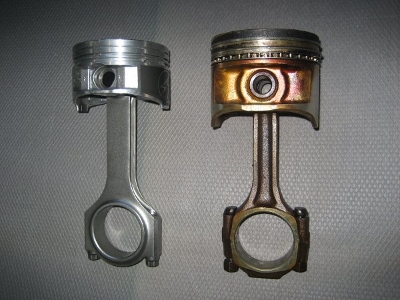Pistons
Not a lot to choose from here, at least not when compared with whats available for the Chev motors for example. And if you plan to build anything besides a 202 the choices are quite limited.
Don't expect to be able to buy forged pistons off the shelf; if you need forged items you'll probably need to get them custom made or else adapt pistons made for something else. Cast high-silicon-content pistons are generally adequate for naturally aspirated engines of the specific outputs we are talking about here, though at the top end of this range the safety margin is getting a bit thin. The main thing of course is to avoid detonation.
More than likely you'll end up using the cast ACL Race-Series pistons in a 202, and these seem to hold up well. The rings supplied with these pistons have a thinner section and lower tension than the standard type pistons, and these are a definite advantage in higher-revving engines. There are flat top versions as well as one with a small dish, and unlike the standard replacement pistons the dish is offset to match the combustion chambers to help preserve some squish. Taper wall pins are available in the Race-Series. These piston and ring packages were designed to be used in higher than normal output applications, and should be fine in nearly any normally aspirated (or even lightly blown) engine. The early 202s had a habit of breaking off the skirt of the original pistons at high revs, though this is not a problem with good quality aftermarket items.
 |
| On the left is a 5.71" Olds Quad4 rod with a Cadillac Northstar piston. This is a drop-in fit in a 202. Stock part on the right. |
If you're building something other than a 202, your choices are much more limited. Many people have had good results from Duralites. These will stand up to much higher pressures and speeds than they were originally designed for, but still you need to be realistic in your expectations. They were never intended for very high compression ratios, and they don't come with the thin low tension Race-Series rings. The stock type piston/ring package wasn't meant to do very high revs, and they will need an extra couple of thou skirt clearance over stock for high performance work. Be extra careful to avoid detonation with standard replacement type pistons because they can be hammered to death very quickly. They'd probably be OK up to about 200hp but if you are going after every horsepower you can get it might be best to do whatever it takes to get some forgings or at least some Hypereutectic type castings.
One thing to keep in mind when using hypereutectic pistons is the end gap of the top ring. This is normally set much wider than in a normal cast or forged piston to prevent end butting. Much damage can be done with insufficient gap so check with the piston and ring manufacturer before you install the pistons.
Using longer rods or a longer stroke length requires a piston with a higher pin height, and this can lead to problems if taken too far. See the section on connecting rods for more detail.